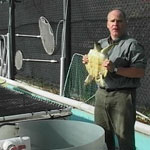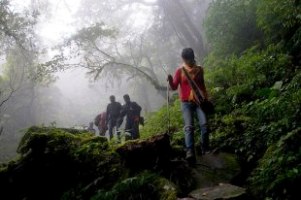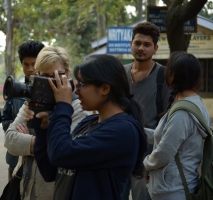It was disappointing to read the interview (Tehelka, Volume 10, Issue 33) reflecting the views of Mr K Vijay Kumar, former Director General of Police, CRPF, currently advisor in the Ministry of Home Affairs (MHA), on tribal insurgency. His law and order approach reveals the bankruptcy of the government’s approach in tackling tribal insurgency, which is clearly an outcome of a flawed tribal development process, which has persisted in India since the departure of Verrier Elwin, tribal advisor to Jawaharlal Nehru (1950s to mid-1960s).
Elwin, a dedicated social worker committed to tribal justice in India, became an Indian citizen and worked for many years among the tribal communities in central and north-eastern India. Unusually for a foreigner, he best understood and helped develop independent India’s policies on tribal change. His approach, sensitively delineated in his autobiography, ‘The Tribal World of Verrier Elwin’ (OUP, 1964), was accepted and followed by Nehru. Vijay Kumar, a bureaucrat and policeman has understandably not examined Verrier Elwin’s majestic output.
Elwin emphasized attitudes and methods in tribal change rather than programmes. He pointed out the need for caution and the danger of overwhelming the tribal people with too many schemes and creating an inferiority complex and anxiety among them about their lands and forests with the influx of too many outsiders into their villages. Nehru accepted Elwin’s formula of developing the tribal people along the lines of their own tradition and genius and rejected ‘reckless’ talk of ‘uplifting and civilising’ the tribes’. Important in this connection are Elwin’s book ‘A Philosophy for NEFA’ and two other works, the Report of the Committee on Multipurpose Tribal Blocks and the Dhebar Commission Report of the Scheduled Castes and the Scheduled Tribes summarized in ‘A New Deal for Tribal India’. Appropriate institutional mechanisms for tribal development were set up in the Union Ministry of Home Affairs, which remained for years the nodal ministry for Scheduled Castes (SC) and Scheduled Tribes (ST) development and protection. After Nehru Elwin’s approach was abandoned and reckless development took over. Vijay Kumar may benefit by reading these and other reports by the Ministry’s Research and Policy (R&P) Division of the MHA delineating the linkages between violence and development. However, in the 1990s, the Scheduled Castes and the Scheduled Tribes Divisions in the Ministry were thoughtlessly transferred to other ministries and the R&P Division wound up.
In 2006, the Planning Commission produced an impressive 18-member Experts Group report on ‘Development Challenges in Extremist-affected Areas’, which contradicted cogently the view of the Intelligence Bureau (IB), ‘attached office’ of the MHA, that Maoist violence was ‘the biggest internal security threat’ to India and suggested an appropriate development strategy for the tribal people. The report was mindlessly side-lined in favour of the law and order view of the IB. Being a police officer, Vijay Kumar’s unthinking approach as revealed in his interview to Tehelka will spell disaster for the tribal people of India.
He must, in the light of the Planning Commission report, convene a meeting of informed experts to make a careful assessment of the challenges he faces instead of mechanically repeating a paramilitary approach from his past. The Planning Commission report states: ‘the methods chosen by the government to deal with the Maoist phenomenon have increased people’s distrust of the police… Protest against police harassment is itself a major cause of unrest frequently leading to further violence by the police in the areas under Maoist influence. The response of the Maoists has been to target the police and subject them to violence, which in effect triggers the second round of the spiral. The rights and entitlements of the people which give rise to the Maoist movement find expression in the Constitution, the laws enacted and the policy declarations. The administration should not have waited for the Maoist movement to remind it of its obligations towards the people. The weaker sections do not have much faith in the police and do not feel that justice will be done to them against the powerful. Often it is as frustrating experience to go to the police station as a complainant as it is fraught with danger to go there as a suspect. One of the attractions of Maoist movements is that it does provide protection to the weak against the powerful and takes security of and justice for the weak and the socially marginalised seriously. These comments call for reflection on the part of Mr Vijay Kumar.
Similarly, BD Sharma, the former Commissioner for SCs and STs, a Constitutional officer reporting directly to the President has noted i) the virtual collapse of the Constitutional regime with regard to the tribal people who are now being attacked and suppressed in a war like situation; ii) the Fifth Schedule of the Constitution, regarded as a Constitution within the Constitution’ provides for the governors of states to write an annual report on the administration of the tribal areas and the giving of directions by the President but no such directions have been issued in the last 60 years; iii) the Constitutional machinery of the Tribal Advisory Council has become extinct; iv) state power extends to the tribal areas subject to the provisions of the Fifth Schedule; v) Panchayat (Extension to Scheduled Areas) Act, 1996 has remained virtually unimplemented; and so is The Forest Rights Act, 2006; and vi) the history of broken promises, predatory administration, co-optation through development programmes and unconcern at the top over massive displacement have led to the multiplication of revolts, which have been met with a brutal paramilitary response.
The Planning Commission’s view thus is that tribal unrest is not just a law and order problem but a deeper developmental issue. Human Rights Watch (2009) has described the Indian police as a ‘broken system’ and ‘a dangerous anachronism’, which calls for radical reforms. An authority on counter insurgency, Sir Robert Thompson in his book ‘Defeating Communist Insurgency’ (cited by former DG BSF Rammohan) has stated that ‘government must function according to rule of law. There is a very strong temptation, in dealing with terrorism and guerrilla actions, for the government forces to act outside the law, the excuse being that the processes of law are too cumbersome, that normal safeguards in the law for individuals are not designed for an insurgency, and that a terrorist is to be treated as an outlaw anyway. Not only is this morally wrong, but over a period, it will create more practical difficulties for the government than it solves. A government that does not act in accordance with the rule of law forfeits the right to be called a government and cannot then expect its people to obey the law. Functioning in accordance with the law is a very small price to pay in return for the advantage of being in government. … In the long term adherence to law is great advantage to the government. It helps to make officers and civilians responsible and accountable for their actions. It puts torture and the shooting of terrorists in their proper place. However great the provocations, both are crimes and the latter is murder… If the government does not adhere to the law, then it loses respect and fails to fulfil its contractual obligation to the people. This leads to a situation where officers and men cease to be responsible for their actions with the result that instead of insurgency, there is, to all intents and purposes, there is a civil war. In such circumstances there is very little to choose between the two sides. The people have no reason for choosing to support the government’.
There is a civil war under way in the Central Tribal Belt of India. Massive Violations of rule of law by state agents have been reported. Unfortunately in his interview Mr Vijay Kumar fails to mention the steps, if any that he proposes to take to enforce the rule of law in the tribal belt of India and to ensure protection of the rights of the tribal people in land and forest and remove their sense of insecurity. Can Vijay Kumar measure up to his challenging task or will he fall by the wayside? Time will tell.







































